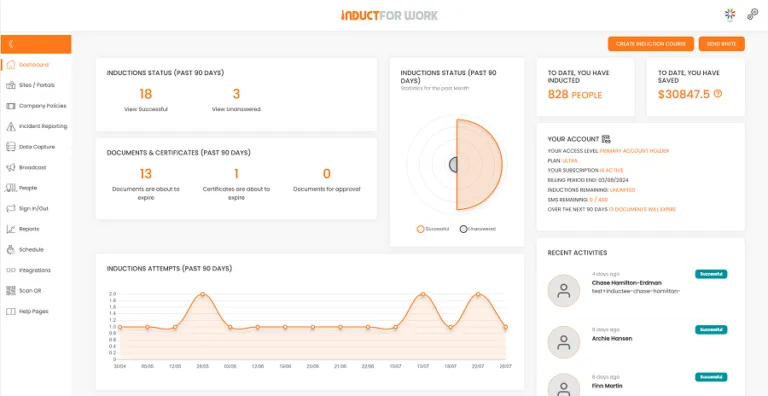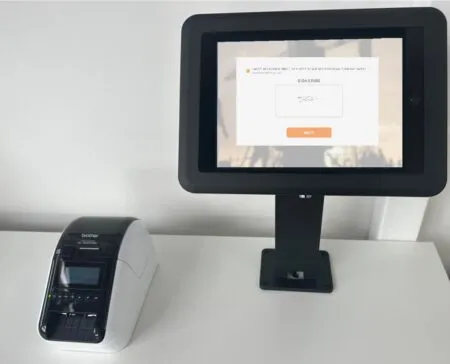The importance of small business compliance software
Running a small business in Australia or New Zealand already means wearing many hats: sales, marketing, payroll, customer care and, perhaps the least glamorous of all, compliance. Whether you manage a café, plumbing crew, boutique agency or regional farm, a web of rules surrounds you—safety, privacy, employment, training, licences, industry codes and more. Missing even one requirement can lead to fines, halted projects or reputation damage you can’t afford.
Yet many owners still track obligations in paper binders or scattered spreadsheets because “that’s how we’ve always done it.” As the rule book grows, this patchwork approach becomes a risk in itself. That is where small-business compliance software steps in, replacing manual admin with clear dashboards, reminders and evidence trails. Below, we explore why modern tools are now essential and how Induct For Work offers an affordable entry point, particularly for businesses that need reliable online inductions.
The cost of getting compliance wrong
Financial penalties
Regulators such as SafeWork, Fair Work and the Australian Taxation Office can issue fines that dwarf the cost of prevention. For example, failing to keep up-to-date safety training records can attract penalties of up to $30 000 under state WHS laws.Project delays or shutdowns
A building inspector who discovers expired high-risk licences can halt work until proof of training appears. For a café, an unrecorded food-safety certificate can lead to an immediate closure notice.Insurance impacts
Many business insurance policies require evidence of training, risk assessments and incident logs. Gaps can drive premiums higher or void cover altogether when you need it most.Reputational damage
Customers post online reviews and social updates within minutes. News of a safety breach or compliance fine spreads quickly and can steer new business elsewhere.
These risks make robust compliance practices not a luxury but a necessity—even for teams of five.
Common compliance pain points for small businesses
Licences and permits – Forklift tickets, responsible-service-of-alcohol cards, food-handling certificates and industry memberships all have expiry dates.
Training records – Safety inductions, privacy briefings and policy acknowledgements must be available for inspection.
Policy updates – When legislation changes, every staff member needs the latest version, not last year’s print-out.
Incident logs – Near-miss reports and corrective actions support continuous improvement but often live on clipboards.
Scattered documentation – HR has some files, site supervisors have others and the owner keeps “the rest” on a laptop.
Manual methods work for a while, but as headcount grows—or audits increase—they crack under the pressure.
How compliance software solves the puzzle
- Centralised storage
One secure cloud platform holds policies, licences, induction modules and incident reports. Staff, auditors and insurers see the same information in real time. Automated reminders
The system tracks expiry dates, sending emails or SMS alerts 30 days before certificates lapse. No more last-minute scrambles when a regulator arrives.Easy reporting
Generate a PDF or Excel export in seconds showing who is trained, which documents are current and where gaps remain.Version control
Update a policy once, press publish and every user sees the latest copy. Historical versions remain archived for proof of due diligence.Access anywhere
Field staff in remote areas finish training on a phone or tablet; owners review dashboards from home. No need for face-to-face meetings just to pass paperwork around.
Scalability
Add new hires or contractors with a couple of clicks. As the company grows, the same system expands rather than forcing a complete rebuild.

Why Induct For Work stands out for online induction
Plenty of software options claim to manage compliance, but Induct For Work focuses on the critical first step: getting people properly inducted and documented before they start work.
Quick set-up – Upload existing slide decks or PDFs, add quiz questions and publish within an afternoon.
Role-based pathways – Baristas see food-handling and customer-service modules; tradies complete safety and equipment lessons. No one trudges through irrelevant content.
E-signatures – Staff sign policies on-screen; signatures are time-stamped and stored against their profile.
Licence uploads – Workers photograph tickets with a phone; expiry dates auto-populate.
Reminders – The system emails workers and managers well in advance of renewal dates.
Offline mode – Perfect for regional or on-site training where internet coverage is patchy.
Affordable plans – Scaled pricing means a micro-business pays only for the seats it uses, with no hidden support fees.
The result is a single source of truth that reduces admin time while satisfying regulators and clients.
Choosing the right compliance platform: checklist for small businesses
Ease of use – Can non-technical staff navigate it within minutes?
Mobile compatibility – Does it work on phones and tablets for field crews?
Licence tracking – Does it store photos, expiry dates and automatic reminders?
Policy management – Can you upload, update and archive documents easily?
Incident reporting – Does it let users log near-misses with photos and notes?
Pricing transparency – Are there setup fees, support charges or long contracts?
Local support – Is help available in Australian business hours?
Scalability – Will it grow with your team without major upgrades?
Induct For Work meets all these boxes while focusing on streamlined inductions—often the most time-consuming compliance pain point for small operations.
Getting started
Switching from spreadsheets to compliance software can feel daunting, but a staged approach keeps it simple:
Audit current documents: licences, policies, training forms.
Prioritise mandatory items (WHS induction, core licences) for immediate upload.
Pilot with one or two staff members; gather feedback and refine.
Roll out across the team once confident.
Review expiry dashboards monthly; schedule refreshers.
Expand modules over time, such as customer-service or cyber-security lessons.
With Induct For Work’s free trial option, many businesses begin uploading content the same day they register.
The bigger picture
Regulation will only tighten as governments mandate stronger safety, environmental and privacy controls. Customers, investors and supply-chain partners also demand evidence of responsible practices. By adopting compliance software now, small businesses position themselves for bigger contracts that ask for digital verification of training and licences. Perhaps more important, they create a safer, more organised workplace that supports staff retention and brand goodwill.
Small-business owners already manage enough stress without worrying whether a licence has expired or if a new hire missed a safety briefing. Compliance software turns these “gotchas” into scheduled tasks that tick themselves off. For companies wanting a first step, an online induction platform like Induct For Work delivers fast wins: uniform training, up-to-date certificates, instant reports and peace of mind—all at a price suited to modest budgets. The payoff is fewer fines, smoother audits and more time to focus on what really matters: serving customers and growing the business.



